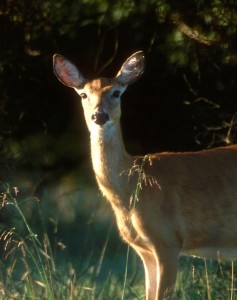Too often, conversations about diet get short-circuited by the certainty and intolerance characteristic of fundamentalism.
Tag: vegetarianism
The world of hunting: Diversity in plain sight
Every once in a while, a non-hunter asks me, “What’s the hunter’s perspective on such-and-such?”
Where a book leads
There is something about following an animal. Or a book.
Eating and caring: The lines we draw
I think everyone holds some version of the same conceptual category: “Fellow creatures about whom I care too much to eat.”
Food in an ideal world
What would your ideal, sustainable world look like?
An open letter to food co-ops
Why don’t food co-ops start selling hunting and fishing licenses?
Deer: Part of every stew, every salad, every stir-fry

Venison, a forester friend tells me, is the best way he knows to eat trees. He points out that whitetails do a dandy job of converting cellulose into protein.
When Cath and I sit down to a bowl of venison stew, we are eating more than potato, carrot, and deer. We are also eating maple seedlings and cedar twigs. We are eating clover from a nearby meadow and corn from the edge of a farm field. We might even be eating hosta leaves and daylily buds from our own flower gardens.
If we lived thirty miles south of here, the whitetails—and thus we—we would be eating many more acorns.
If we lived where soy crops were common, they and we would be eating many more soybeans. (Given deer’s fondness for soy, I think it’s fair to consider Illinois venison a highly metabolized form of tofu.)
In a sense, though, the flip side is also true.
In my latter days as a vegan, I was shocked to learn how many whitetails are killed by farmers. Considering that deer were being shot to bring us tofu, how vegetarian were our stir-fries? Considering that they were even being shot to bring us greens and strawberries from the organic farm just down the road, how vegetarian were any of our meals?
I was also fascinated to learn about the role that agriculture played in the politics of early deer management.
Take Vermont, for instance: In 1897, when the state legislature allowed deer hunting for the first time in three decades, the move was made largely in response to farmers’ complaints about crop losses as the nearly exterminated whitetail began to recover. Up through 1920, the regulation of deer hunting in Vermont—for both bucks and does—was largely determined by agricultural interests and was aimed at keeping deer numbers low.
By 1920, though, hunting was becoming popular. The political tide had begun to turn and the Vermont legislature established bucks-only regulations that allowed the whitetail population to grow.
As a vegan, I could have argued that hunters themselves created the present situation—in which the successful cultivation of just about every American crop depends on killing deer. I could have pointed out that deer would still be scarce today if farmers had had their way.
But what would I have been advocating for? More intensive hunting in the past, to relieve me of a moral quandary in the present?
No matter how I sliced it, deer would always accompany me at the dinner table.
Note: I got thinking about this post after reading a recent piece by Al Cambronne, wherein I learned one more thing I didn’t want to know about the U.S. beef industry. If chicken droppings don’t strike you as a taste treat, you might not want to know either.
© 2011 Tovar Cerulli
